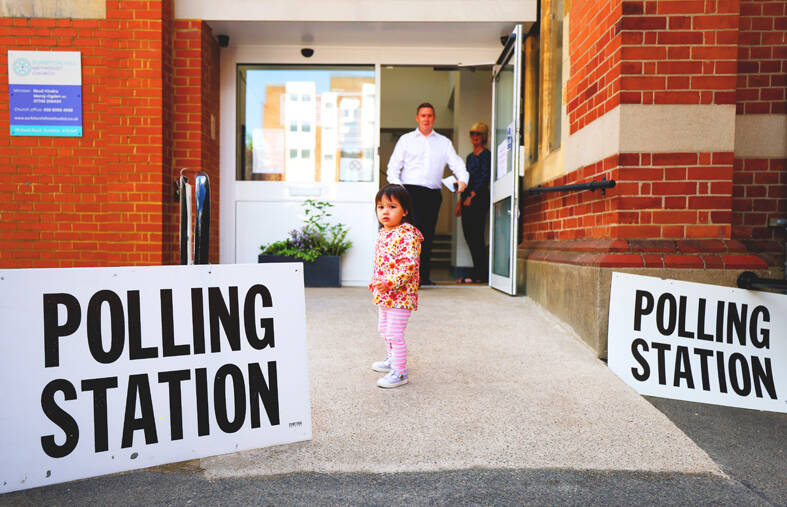Britons headed to the polls yesterday in a general election widely expected to emphatically return the opposition Labour Party to power and end nearly a decade-and-a-half of Conservative Party rule.
The country’s first national ballot since former British prime minister Boris Johnson won a landslide for the conservatives in 2019 follows Prime Minister Rishi Sunak’s surprise call to hold it six months earlier than required.
His gamble looks set to backfire spectacularly, with polls throughout the six-week campaign — and for the past two years — pointing to a heavy defeat for his right-wing party.

Photo: EPA-EFE/ANDY RAIN
That would almost certainly put Labour Party leader Keir Starmer, 61, in Downing Street, as leader of the largest party in parliament.
Center-left Labour is projected to win its first general election since 2005 by historic proportions, with a flurry of election-eve polls all forecasting its biggest-ever victory.
However, Starmer was taking nothing for granted as he urged voters not to stay at home.
“Britain’s future is on the ballot,” he said. “But change will only happen if you vote for it.”
Voting began at 7am in more than 40,000 polling stations across the country, from church halls, community centers and schools to more unusual venues such as pubs and even a ship.
Polls suggest voters would punish the Conservatives after 14 years of often chaotic rule and could oust a string of government ministers, with talk that even Sunak himself might not be safe.
That would make him the first sitting prime minister not to retain his seat in a general election.
“I appreciate people have frustrations with our party,” he conceded on Wednesday. “But tomorrow’s vote ... is a vote about the future.”
Sunak, 44, is widely seen as having run a dismal campaign, with anger over his decision to leave D-Day commemorations in France early the standout moment.
In new blows on Wednesday, the Sun newspaper switched allegiance to Labour — a key endorsement given the tabloid has backed the winner at every election for several decades.
It follows the Financial Times, The Economist and the Sunday Times, as well as traditionally left-leaning papers the Guardian and the Daily Mirror, also endorsing the party.
Meanwhile, three large-scale surveys indicated Labour was on the brink of a record victory, with the Conservatives set for their worst-ever result and the centrist Liberal Democrats resurgent in third.

Four people jailed in the landmark Hong Kong national security trial of "47 democrats" accused of conspiracy to commit subversion were freed today after more than four years behind bars, the second group to be released in a month. Among those freed was long-time political and LGBTQ activist Jimmy Sham (岑子杰), who also led one of Hong Kong’s largest pro-democracy groups, the Civil Human Rights Front, which disbanded in 2021. "Let me spend some time with my family," Sham said after arriving at his home in the Kowloon district of Jordan. "I don’t know how to plan ahead because, to me, it feels

Polish presidential candidates offered different visions of Poland and its relations with Ukraine in a televised debate ahead of next week’s run-off, which remains on a knife-edge. During a head-to-head debate lasting two hours, centrist Warsaw Mayor Rafal Trzaskowski, from Polish Prime Minister Donald Tusk’s governing pro-European coalition, faced the Eurosceptic historian Karol Nawrocki, backed by the right-wing populist Law and Justice party (PiS). The two candidates, who qualified for the second round after coming in the top two places in the first vote on Sunday last week, clashed over Poland’s relations with Ukraine, EU policy and the track records of their

‘A THREAT’: Guyanese President Irfan Ali called on Venezuela to follow international court rulings over the region, whose border Guyana says was ratified back in 1899 Misael Zapara said he would vote in Venezuela’s first elections yesterday for the territory of Essequibo, despite living more than 100km away from the oil-rich Guyana-administered region. Both countries lay claim to Essequibo, which makes up two-thirds of Guyana’s territory and is home to 125,000 of its 800,000 citizens. Guyana has administered the region for decades. The centuries-old dispute has intensified since ExxonMobil discovered massive offshore oil deposits a decade ago, giving Guyana the largest crude oil reserves per capita in the world. Venezuela would elect a governor, eight National Assembly deputies and regional councilors in a newly created constituency for the 160,000

North Korea has detained another official over last week’s failed launch of a warship, which damaged the naval destroyer, state media reported yesterday. Pyongyang announced “a serious accident” at Wednesday last week’s launch ceremony, which crushed sections of the bottom of the new destroyer. North Korean leader Kim Jong-un called the mishap a “criminal act caused by absolute carelessness.” Ri Hyong-son, vice department director of the Munitions Industry Department of the Party Central Committee, was summoned and detained on Sunday, the Korean Central News Agency (KCNA) reported. He was “greatly responsible for the occurrence of the serious accident,” it said. Ri is the fourth person